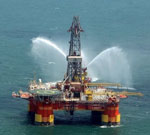 AFP: The IEA raised slightly its outlook for growth of oil demand this year but warned on Friday that risks of a shock from Iran persisted despite easing prices and a supply boost by OPEC.
AFP: The IEA raised slightly its outlook for growth of oil demand this year but warned on Friday that risks of a shock from Iran persisted despite easing prices and a supply boost by OPEC.
 PARIS (AFP) — The IEA raised slightly its outlook for growth of oil demand this year but warned on Friday that risks of a shock from Iran persisted despite easing prices and a supply boost by OPEC.
PARIS (AFP) — The IEA raised slightly its outlook for growth of oil demand this year but warned on Friday that risks of a shock from Iran persisted despite easing prices and a supply boost by OPEC.
In its monthly report, the International Energy Agency said that oil prices had dropped sharply in April amid poor economic data from the US and Europe and an apparent easing of tensions between Iran and the West.
But despite easing tensions on the market, the IEA said “there is no room for complacency: the path of market fundamentals for the rest of the year remains highly uncertain and geopolitical risks will likely continue to keep prices high.”
The world’s four biggest markets should dominate the demand story in 2012, the IEA said, with declines seen in the Europe and the US, but demand picking up slightly in China and more firmly in Japan.
Oil consumption in Europe “is in a dire state, matching the region’s general state of economic malaise”, but declining trends in North America seemed to be abating, the IEA said.
In China, demand is growing but “remains muted in comparison to the double-digit percentage point gains seen at the beginning of 2011”, the agency noted.
The International Energy Agency said that demand for oil would increase in 2012 by 0.8 million barrels per day (mbd) to 90.0 mbd, with consumption in emerging countries “more than offsetting” declining demand in richer OECD countries.
On the supply front, the IEA said OPEC nations had begun to boost output in April in order to meet any potential supply shocks owing to tensions with Iran.
The agency said that global supply increased by 0.6 mbd to 91 mbd in April and raised its call on expected output from OPEC in the third quarter of 2012 by 0.2 mbd to 30.9 mbd and by 0.4 mbd to 30.7 mbd for the fourth quarter.
But Iran remained a bit of a mystery, the IEA said, where crude output was unchanged at 3.3 mbd in April, but an approaching July sanctions deadline from the European Union promised uncertainty in the coming months.
“While some of the country’s main buyers, including Japan and South Korea, are gradually reducing Iranian crude imports, other countries such as Turkey and South Africa appear to have ramped up imports ahead of the … deadline,” the IEA said.
But the IEA warned that tracking Iranian exports has become increasingly difficult following reports that the National Iranian Tanker Company had ordered its vessels to shut-off their communication beacons.
Supply from Non-OPEC countries was tight in March with the IEA signalling ongoing production disruptions in Australia, Colombia, Brazil, the North Sea and Africa.
Non-OPEC supply fell around 600,000 barrels per day in March, the IEA said, and the agency now sees supply expanding by 0.6 mbd to 53.3 mbd for 2012, with disruptions partly offset by US companies expanding into shale gas drilling.
But more “worrisome for the medium and longer term is the precedent set in Argentina, where the expropriation of Repsol assets by the government raises concerns about contract sanctity,” the IEA said.
Last month, the government of President Cristina Kirchner seized control of Spanish oil giant Repsol’s Argentinian subsidiary with some 26 percent to be held by the federal government and 25 percent going to the provinces.
Politically expedient measures like Argentuina’s shock move have “been toyed with before in the region, with adverse results, not least on oil and gas supply,” the IEA noted
“Without certainty that contracts will be respected, foreign investors are likely to shun” investment in the natural resource sector “in favour of more predictable domains,” it said.
Oil prices fell in Asian trade Friday, weighed down by disappointing Chinese trade data and the increase in crude production by the OPEC cartel, analysts said.
New York’s main contract, West Texas Intermediate crude for delivery in June, was down 96 cents to $96.12 per barrel while Brent North Sea crude for June shed 84 cents to $111.89 in the afternoon.


